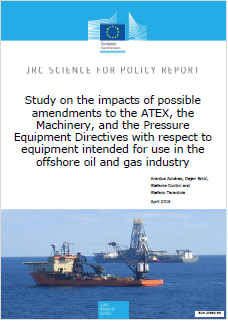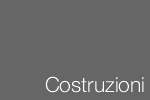
ATEX, Machinery Directive, PED: Study amendments for OSD
Study on the impacts of possible amendments to the ATEX, the Machinery, and the Pressure Equipment Directives with respect to equipment intended for use in the offshore oil and gas industry.
Following the explosion of the Deepwater Horizon drilling rig in the Gulf of Mexico in 2010, the Offshore Safety Directive 2013/30/EU (OSD) was adopted in the European Union.
This Directive applies to both fixed and mobile offshore units and is the main mechanism for ensuring that the safety and the environmental protection are fully regulated in the Union waters.
Mobile offshore units are considered as seagoing vessels and their safety is subject to rules in the International Maritime Organization (IMO) (see the Code for the Construction and Equipment of Mobile Offshore Drilling Units (2009 MODU Code)). However, according to point 6 of the preamble of the 2009 MODU Code, “the Code does not include requirements for the drilling of subsea wells or the procedures for their control”, being such drilling operations subject to control by the coastal State (although a harmonised approach at EU level does not exist at the moment).
Contrarily to fixed units (both offshore and onshore), mobile offshore units, and the equipment installed on them, are currently excluded from the EU Product Safety Directives, namely the Machinery Directive (MD), the Pressure Equipment Directive (PED) and the ATEX Directive.
This exclusion has however exceptions to be considered. For example:
- Floating units intended for production, and the machinery/equipment on-board such units are not excluded from the scope of the MD and PED since these are intended to be located on the oil field for the long term and hence considered as fixed units;
- Machinery which may be installed on both fixed and mobile offshore units is also subject to the MD (guidelines to the application of the MD);
- The exclusion under the PED similarly only applies to “equipment specifically intended for installation on-board mobile offshore units or for the propulsion thereof”. However, equipment intended for installation on both mobile and fixed offshore units falls within the scope of the PED.
The purpose of this study is to provide the Commission with the information necessary for the assessment of the economic, social, and environmental impacts of a possible extension of the scope of the EU product safety legislation (ATEX Directive 2014/34/EU, Pressure Equipment Directive 2014/68/EU and Machinery Directive 2006/42/EC) with respect to equipment intended for the use in the offshore oil and gas industry.
Whereas equipment on fixed units is in the scope of these three Directives, mobile offshore units and equipment installed on them are currently in general excluded. In addition the Pressure Equipment Directive excludes also well-control equipment. The study investigates whether there are safety issues which could be addressed by extending the scope of the Directives and what would be the impacts of such an extension.
European Commission 2016
Info e download
|




































